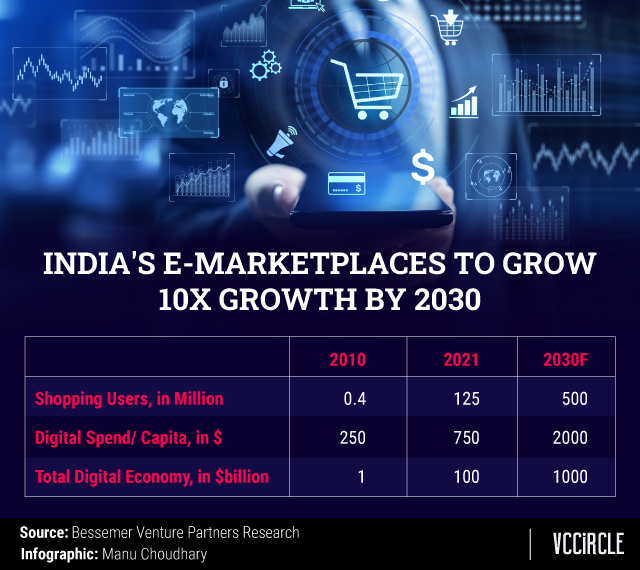With rising internet penetration in the last decade, innovation in the fintech space with the development of unified payments interface (UPI), and maturation of supply chain and logistics solutions, global venture capital firm Bessemer Venture Partners sees a 10x growth opportunity for internet marketplaces in India, representing about over $1 trillion in value, a top executive told VCCircle in an interaction.
The VC firm broadly discussed all developments it expects for internet marketplaces in India in the next 8-10 years. “Whatever has happened in the internet marketplaces (space in India) in the last 10 years is just the tip of the iceberg. (At present,) there is a ten-fold opportunity,” one of the managing partners, Anant Vidur Puri said.
According to a report by Bessemer on the same trend, as of July 2022, India’s internet penetration has grown to about 59%, giving businesses the opportunity to operate online. Simultaneously, only about 20% of India’s internet users transact online, thus, giving way to this growth opportunity.

Explaining the evolution of consumer segments in India in the last couple of years, the report notes that in its next phase, India will see new millennials comprising a bigger chunk of women than before, households, SMEs (small and medium enterprises), and population from tier-II cities and beyond, jump to online marketplaces, which will require several shifts in strategy going forward.
“You can’t have the same formula for everyone,” said Puri.
The report bifurcates e-marketplaces into new consumer marketplaces including the likes of Nykaa, Spinny, etc; direct-to-consumer (D2C) marketplaces such as Faballey, Clovia, among others, and business-to-business (B2B) ones likes Moglix, Zetwerk, among others, which cumulatively represent a $1 trillion opportunity.
Hence, catalogue-led product discovery must evolve to welcome the new customers’ segments which often use distribution channels including social media, video, or influencer-based commerce, in some cases.
The report also points to the centrality of personalization and niche segmentation to attract audiences to e-marketplaces.
“India will see continued growth of existing large internet incumbents as they continue to build on their advantage of scale and distribution. Meanwhile, several hundred billion dollars of value will be generated by businesses serving these new consumer segments through novel business models."
Currently, Bessemer Venture Partners’ portfolio consists of eight India-based consumer internet startups, which form a part of the VC firm’s larger investment roadmap for India. It has invested in online marketplaces including BigBasket, Swiggy, PharmEasy, Urban Company, Livspace, The Good Glamm Group, among others. Some other key segments in its roadmap include fintech, software-as-a-service (SaaS), and healthtech, among others.
The VC investor has highlighted the key tenets of the segment, which include building tech to scale, manage, standardize and retain supply as India, according to Bessemer, is a supply-constrained market. Owning distribution channels as it creates an edge over distribution at third-party marketplaces, is another key tenet as per the report.
“While third party marketplaces can get a company faster scale, long-term consumer loyalty only comes via owned distribution channels,” according to the report.
The development of a full-stack model is central for e-marketplaces across segments. “Full-stack model wins,” Puri said, allows in widening margins and ensuring a better consumer experience.
The report also looks at keeping customer acquisition costs (CAC) in check, as the firm considers its ballooning expense, and keeping its flatline cohorts, or those which help customer retention, are the key to maintaining sustainable profitability.
Bessemer Venture Partners is a US-based venture capital firm. It started investments in India since 2006 and currently invests out of its dedicated $220-million fund launched in November 2021. It also invests from its global BVP XI and Century growth funds.